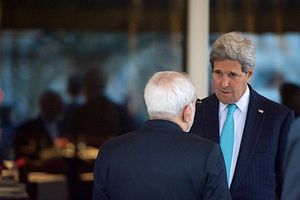Depending on whom you ask, April’s nuclear framework agreement between the P5+1 countries (the United States, United Kingdom, China, France, Russia, and Germany) and Iran represents anything from an unprecedented diplomatic feat to reckless endangerment of the world’s population. For proponents of targeted, or “smart,” sanctions, it was unquestionable proof of such punitive financial measures’ effectiveness as a foreign policy tool. They may be right. The unprecedented regime of UN, regional, and national sanctions leveled against Tehran was instrumental in slowing its progress toward nuclear weapons capability and bringing Iran’s leaders to the negotiating table. Even so, targeted sanctions’ proponents must not rest on their laurels. Despite some successes, serious problems with sanctions programs remain, and it is time for the United States to rethink its approach.
Growing support for targeted sanctions is indeed a positive development. Past comprehensive sanctions regimes crippled national economies and exacted dire humanitarian tolls, all while proving disappointingly limited in their effectiveness at altering foreign leaders’ behavior. The oft-cited UN Security Council sanctions imposed on Iraq in the 1990s failed to compel disarmament and ultimately led to the deaths from starvation of up to half a million Iraqi children as the country’s economy collapsed. Targeted sanctions, on the other hand, include arms embargoes, asset freezes, travel restrictions, and trade sanctions designed to pressure individual policymakers rather than an entire population whose suffering is unlikely to affect top-level decision making.
The United States has been particularly enthusiastic about such measures. Indeed, President Obama expanded their use in April with an executive order authorizing sanctions in response to cyberattacks targeting U.S. assets or infrastructure. Targeted sanctions are certainly a potent weapon in an era in which economic power has become as important as military might, but our current approach has not always yielded the desired results. We therefore need to take a hard look at how we use these measures, what they can and cannot do, and how we can make smart sanctions smarter.
Message matters. Western leaders tend to use sanctions to increase domestic political pressure on a targeted government, but by providing a regime with an external enemy, sanctions can actually strengthen that regime’s position. Recent U.S. sanctions on Venezuelan officials have bolstered President Nicolas Maduro, who has seized on the pretext of “American imperialism” and “aggression” to rally public opinion and obtain special decree powers from his country’s parliament. To avoid such costly mischaracterization, the Obama administration should combine sanctions with public diplomacy efforts to engage a target country’s people directly. Coupling sanctions with a concerted messaging campaign will diminish leaders’ ability to politicize these measures for their own ends. An informed public is a powerful asset in this regard, and engaging influential figures from fields such as business can be particularly effective. When Guatemalan President Jorge Serrano attempted a power grab by dissolving his country’s parliament in 1993, the threat of U.S. and European sanctions and the ensuing lost profits led a coalition of tycoons to organize public opposition. The resulting protests and petitions ultimately forced Serrano to resign.[i] The United States should take note of their efforts and harness such public energy in future sanction campaigns.
Don’t overdo it. Sanctions’ power and status as an alternative to military force make them an attractive tool, but overreliance will decrease their effectiveness in the long run. Sanctions work because countries are willing to participate in the Western-dominated international financial system. If foreign leaders begin to fear being cut out of that system through asset freezes and other financial sanctions, they will pursue alternatives. Russia has already tried to insulate itself from Western sanctions by establishing a National Payment Card System and requiring that all payments be processed domestically. Western sanctions’ effectiveness will decrease significantly should more countries opt for such alternatives. Washington must therefore use these measures judiciously and sparingly, and only in response to serious threats to core U.S. interests.
Know the limits. Above all, we must recognize that sanctions are not a panacea. Understanding when a tool works and when it doesn’t is essential to obtaining the desired results, and we need a more thorough look at what sanctions can’t do, particularly on issues that target countries see as core national interests. UN sanctions on North Korea have been useful in limiting the flow of nuclear materials and technology to the country, but have had no discernible effect on decision making, as the threat posed by Pyongyang’s nuclear program continues to grow. Recent efforts to stop Russia’s aggression in Ukraine, meanwhile, have shown sanctions’ limited success in compelling Vladimir Putin to reverse course on what he sees as a defining issue for his presidency and his country. A move toward smarter sanctions would recognize these measures’ limits and use them only in those situations where they are effective, rather than as the default response when policymakers simply want to appear decisive and responsible.
We still don’t know whether Iran and the P5+1 countries will reach a final deal on Tehran’s nuclear program, or whether the threat of renewed sanctions will be enough to ensure that Iran ultimately complies. But it is clear that targeted sanctions’ potential to effect high-level change has grown, especially as global financial and economic ties have deepened. To harness that power effectively, we need to think about how, when, and why we use these measures to ensure that they have their intended effect. If we do not, sanctions will continue to fall short of their strategic goals and result in unintended, often counterproductive, consequences. By rethinking our approach, we can make smart sanctions smarter.
Brittney Lenard is a Young Professionals in Foreign Policy Fellow for the Changing Nature of Power program. She was previously a member of the Europe and Eurasia practice at McLarty Associates, an international strategic advisory firm in Washington, DC.
































